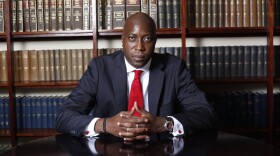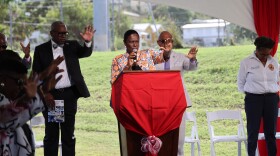ST. CROIX — On Monday, Charlene Turnbull, interim CEO of the West Indian Company Limited, and Hugo Hodge Jr., chairman of the WICO board’s Finance Committee, both refused to answer questions about salary, unpaid bills, board per diem totals, budget discrepancies, and Banco Popular refinancing from senators attending the Legislature’s Committee on Budget, Appropriations and Finance.
Turnbull’s justification was, “My understanding is we’re a private company, and certain information is private.”
Hodge was equally as tight lipped. When asked by Senator Hubert Frederick if WICO was considered a private entity owned by the VI government, Hodge said the question is highly debated and has been through legal recourse. Therefore, he said he did not think it was appropriate to discuss it during the committee meeting.
The following day, Nathan Simmonds, Director of Finance and Administration of the Public Finance Authority, WICO’s parent company, for the second time in as many months confirmed to the Legislature that WICO is a public corporation.
During a June 23 Committee on Government Operations, Veterans Affairs and Consumer Protection meeting, Simmonds affirmed that WICO is wholly owned by the PFA under Act No. 5826, which granted it public corporation status.
When Simmonds appeared before senators on Tuesday to testify about the fiscal year 2026 executive budget, he reconfirmed WICO’s public status in response to a question from Frederick.
In a March article, WTJX outlined in detail decisions from the Superior Court, Virgin Islands Supreme Court, the U.S. Third Circuit Court of Appeals, Act 5826 and its clarifying amendment, WICO’s receipt of FEMA funding, which is only extended to public entities, and a July 2, 2019 Government House press release in which Governor Albert Bryan Jr., chair of the PFA, WICO’s parent company, told the port company to comply with the open records law. The governor, however, appeared to have changed his view, telling The Virgin Islands Consortium in March that WICO is “privately owned by the government.” Despite these clear delineations, WICO dug its heels in, continuously asserting private company status.
READ MORE: “Virgin Islands law appears to restrict Joseph Boschulte from heading WICO as its president and CEO”
In a surprising turn on Thursday, WICO Board Chair Jason Charles broke from Hodge’s stance earlier in the week and conceded to WTJX that indeed WICO is a public entity.
“I’m not going to be like my predecessors before me,” he said. “WICO is a public entity. And as such, it’s subjected to all the rules and regulations of a public entity. I think, for years, people have tried to spin the narrative differently, but the law is the law, and we can’t pretend to ignore the law. It’s a public entity.”
Frustrated with the lack of transparency from WICO at Monday’s hearing, Senator Novelle Francis Jr., committee chair, stated that WICO will be scheduled to return before the committee.
“I hope at that time, we could really be able to flush out and look at the numbers and be able to make an informed decision,” he said.
It seems that Francis will get his wish.
“It is my expectation that the staff and management of WICO will be transparent with the first branch of government,” Charles said. “They have the right to get full access and full information as to what WICO’s financial position is and strategy.”
Working in tandem with the public-entity issue is the looming question of who will be WICO’s next CEO.
Bryan said at a March 24 press conference that Joseph Boschulte was offered the job as WICO’s next CEO, but had neither accepted nor declined the offer, as negotiations were ongoing. However, by law, Boschulte should not be able to assume the position until a year after he resigns from WICO’s board of directors. Virgin Islands Code, Title 3, Chapter 5, Section 65d(c) prohibits individuals serving as an employee of a board or commission, in any capacity, within one year of having served as a board or commission member of the same board with which they are seeking employment.
Charles confirmed to WTJX that Boschulte resigned from the board; however, he did not disclose the date of his resignation. The last public board meeting that Boschulte attended was on February 28. Charles said an announcement of the next CEO is forthcoming.
“That’ll be coming up in the near future,” he said.
As the WICO board prepares to announce the entity’s next CEO, Boschulte is no longer serving as commissioner of the Virgin Islands Department of Tourism. Bryan announced his departure during a Government House press briefing on July 28 when he named Jennifer Matarangas-King as his nominee to lead the department. Matarangas-King told senators during a budget hearing for the Department of Tourism on Tuesday that Boschulte would remain on the payroll for another 30 days to ensure a smooth transition.
And during a board meeting today, the PFA unanimously approved a motion to appoint Matarangas-King to the WICO board, replacing Boschulte.
Another board member recently resigned from the lucrative WICO board, which boasts a $1,500 per diem ($2,000 for the chair) per meeting. Enrique Rodriguez, a close associate of Lieutenant Governor Tregenza Roach, resigned recently. Rodriguez last responded to roll call at WICO’s public meeting on May 23. This leaves the board with Charles, Hodge, Olric Carrington, Vincent Richards, Prakash Daswani, former Senator Roosevelt St. C. David, and now Matarangas-King.
WICO’s per diem may have to fall in line with the per diem for other public boards now that its leadership has acknowledged its public-entity status. Government boards’ per diem is $75 per meeting, plus travel expenses.
As for WICO’s next trip to the Legislature, Charles is optimistic that the public corporation’s leadership can provide transparency to the senators and that the Legislature can provide them with some degree of cover.
“I would hope that our honorable senators recognize, though, that we are in a very competitive market, and, as such, certain information relative to our business — a lot of our competitors out there, St. Kitts, St. Lucia, St. Martin, the BVI — they would love to know certain things, and so I would hope that they would use discernment in the questions that they ask,” Charles said. “They have a right to ask those questions, and we have to answer those questions. But I hope that they wouldn’t compromise our strategic position with our competitors by asking questions that will inadvertently compromise the institution, which generates over $500 million worth of economic value to the U.S. Virgin Islands economy.”















